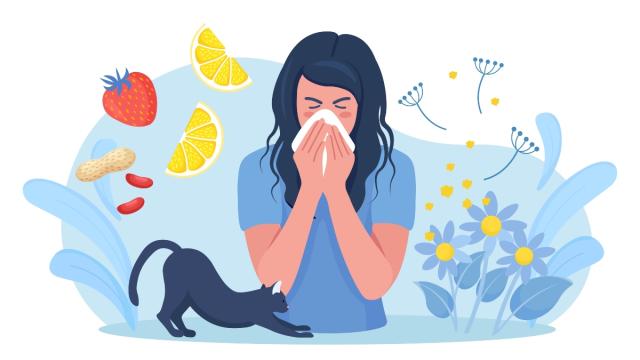can you develop allergies later in life? The fact that allergies may appear at any point in life surprises many people who have never had an allergic reaction. The term “adult-onset allergies” refers to this phenomenon, which raises the issue of why allergens may manifest later in life and how best to manage them.

What are the Types of Allergies
Allergies are chemicals that cause reactions in a variety of ways. The most prevalent types of allergies are
- Skin reactions (contact eczema)
- Allergies to foods
- Allergies to the seasons (hay fever)
Every variety presents differently and calls for particular approaches to management.
How Can You Develop Allergies Later in Life
Adults who have never experienced allergies as youngsters are not unusually affected by them. The immune system’s alterations as well as long-term exposure to allergens are some of the contributing elements to this. The development of allergies can be influenced by immune system modifications that occur with aging.
What are the Symptoms Can You Develop Allergies Later in Life
Adult allergy sufferers might discover it hard to distinguish their symptoms from those of other illnesses, such as infection of the sinuses or the typical cold. The lungs, skin, or digestive tract can all be affected by symptoms, which might range in intensity.
Diagnosis of Can You Develop Allergies Later in Life
It’s important to see allergists if you think you may have adult-onset allergies. Allergy testing, such as serum test finger prick examinations, may assist with successful therapy and control by discovering precisely the allergies generating the signs.

Management and Treatment
A key component of managing adult-onset allergies is minimizing trigger exposure. Medications such as nasal sprays and tablets may help with symptom relief. In circumstances when sensitivities are severe or chronic, allergen immunotherapy, or allergy injections, may be advised.
Living with Allergies
Adjusting your way of life to manage your allergies may involve changing how you live to limit your exposure to allergens. To create an atmosphere of security, you must always carry the medicines that you need and let people know about your allergies.
Prevention of Allergies
Earlier exposure to possible allergens and keeping excellent indoor air quality help lower the chance of allergies later in life, while they are not always prevented. Important precautions include raising awareness of allergies and getting medical attention as soon as symptoms appear.
Conclusion
Allergies that develop in adults can be perplexing, but they are treatable with the right diagnosis and care. Being aware of the symptoms, triggers, and management techniques helps people live peacefully with allergies.
Frequently Asked Questions
Can you develop allergies at any age?
Allergies can occur at any age, however, they most frequently do so in childhood.
What causes allergies to appear later in life?
Older people may have immune system alterations that increase their vulnerability to allergies.
Is it possible to prevent adult-onset allergies?
Reducing exposure to allergens and upholding a healthy lifestyle can help mitigate the risk, however, it’s not always prevented.
